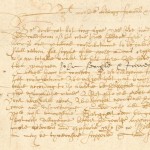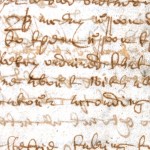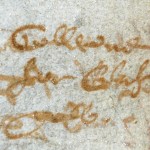The Great Fire of Glasgow happened on the 17th June 1652, 14 years before the perhaps more famous conflagration in London but was no less devastating. The blaze began in the house of one James Hamilton in the High Street and quickly spread to surrounding properties blown by an unseasonal north-westerly wind. The flames spread south to the Saltmarket and east and west along Trongate and Gallowgate, eventually reaching as far south as Bridgegate. The fire burned, out of control, for 18 long hours and by the time it began to die down around a third of the city had been destroyed. The houses in the city were made of wood and thatch and burned quickly. Many people were killed and over a thousand families were made homeless.
The Town Council of Glasgow made application to the British Government, at that time under the control of Oliver Cromwell, for assistance with the rebuilding of the devastated areas of the city. The cost of the damage was estimated at £100,000 sterling, a huge sum of money at that time and there was no way in which the local authorities could meet that cost. Parliament eventually gave just £1000 sterling and commented that they would ‘…recommend them as high objects of charity to such pious and well-disposed people as shall be willing to contribute…’ Meanwhile, the displaced families were being accommodated in church halls and wooden huts erected as temporary shelters in fields around the city.
At the same time as these letters were sent out to the neighbouring burghs in Scotland asking for financial help, an appeal was also sent to the General Assembly of the Church of Scotland requesting that collections be made. There is a note in the Dunblane Presbytery minutes for 26th October 1652 that ‘…the collection for Glasgow should be gone about with all diligence and so be givn unto the moderator according to the right of the Gen: Assembly…’
A search was made in the Stirling Burgh accounts for 1652 but there is no entry for a donation to the Glasgow fire fund. Colleagues at Glasgow City Archives looked in their Burgh accounts to see if a donation from Stirling was mentioned but there was no reference to one. The Burgh minutes deal with the after-effects of the fire but the only burghs mentioned as having given money are Edinburgh, Aberdeen, Ayr and Linlithgow. It is known from other archive documents that money was tight in Stirling after the upheavals of the Civil War period so it is likely that the Burgh authorities felt that they could not spare money in response to the appeal.


